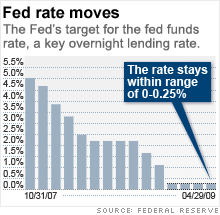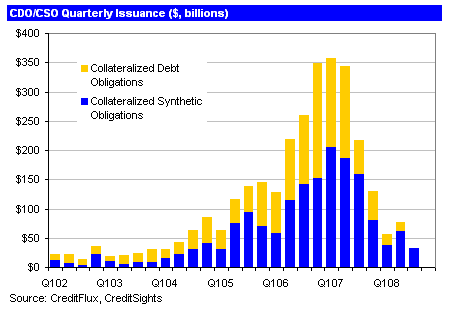Last week, the Fed opted to maintain its benchmark Federal Funds Rate close to zero, and indicated in its press release that it “anticipates that economic conditions are likely to warrant exceptionally low levels of the federal funds rate for an extended period.” [Chart courtesy of CNN].
 Nonetheless, the Fed made a point of emphasizing that the economy seems to be stabilizing: “Information received since the Federal Open Market Committee met in March indicates that the economy has continued to contract, though the pace of contraction appears to be somewhat slower.” I suppose everything is relative, but it’s a bit perplexing as to where the Fed is getting its data from, given that “Gross domestic product, the broadest measure of economic activity, fell at an annual rate of 6.1% in the first quarter of 2009 after a 6.3% drop in the last three months of 2008.” This exceeded analysts’ expectations for a 4.7% decline, and if anything, would seem to suggest that the economy is worsening. Granted, consumer spending rose slightly and inventories declined, but the aggregate picture paints an unequivocal picture of an economy in deep recession.
Nonetheless, the Fed made a point of emphasizing that the economy seems to be stabilizing: “Information received since the Federal Open Market Committee met in March indicates that the economy has continued to contract, though the pace of contraction appears to be somewhat slower.” I suppose everything is relative, but it’s a bit perplexing as to where the Fed is getting its data from, given that “Gross domestic product, the broadest measure of economic activity, fell at an annual rate of 6.1% in the first quarter of 2009 after a 6.3% drop in the last three months of 2008.” This exceeded analysts’ expectations for a 4.7% decline, and if anything, would seem to suggest that the economy is worsening. Granted, consumer spending rose slightly and inventories declined, but the aggregate picture paints an unequivocal picture of an economy in deep recession.
Bernanke, apparently, is unconvinced. ” ‘We continue to expect economic activity to bottom out, then to turn up later this year,’ Mr. Bernanke told the congressional Joint Economic Committee.” Meanwhile, the unemployment rate is currently 8.5% and falling. Business investment is still abysmal, as companies implement hiring freezes and hold off on all non-essential capital purchases.
Bernanke is especially optimistic about the state of the US financial system, noting that “conditions in credit markets have revived slightly in recent weeks. Homeowners are refinancing mortgages at a rapid clip, and financial institutions have stepped up their sale of securities backed by of credit card loans, automobile debt and student loans.” However, mortgage refinancing is a red herring, and frees up very little cash for consumption. Meanwhile, debt securitization is well below 2007 levels, and some experts predict that credit card loans represent the next catastrophe. “Fitch’s Prime Credit Card Delinquency Index measures credit card debt more than 60 days late. Through January 2009 that index surged to a record 4.04 percent.”

Bernanke also hinted that the results from the bank stress-tests, scheduled to be released today, are largely positive. As part of this program, “The government plans to divide banks into three categories, based on the adequacy of their capital reserves to absorb projected losses,” if the recession were to worsen. If Bernanke’s assertions are to be believed, then the tests will show that their capital reserves are sufficient, and they will not need additional capital infusions.
Bernanke’s testimony and the Fed Statement have been greeted positively by investors, “contributed toimproving sentiment and boosted risk appetite, easing demand for then yen and greenback as safehavens.” Nonetheless, everything he says should be taken with a grain of salt. Even with the best rose-tinted glasses money can buy, it’s hard to draw such optimistic conclusions from an objective interpretation of the data. Either Bernanke is basing his assessment off of the stock market rally (which is circularly based on such economic optimism), or he is trying to deliberately distort reality in order to try to make a recovery self-fulfilling by disingenuously telling people that everything is okay. Personally, I don’t think he’s worth taking seriously.

0 comments:
Post a Comment